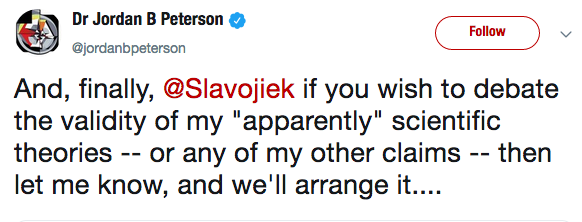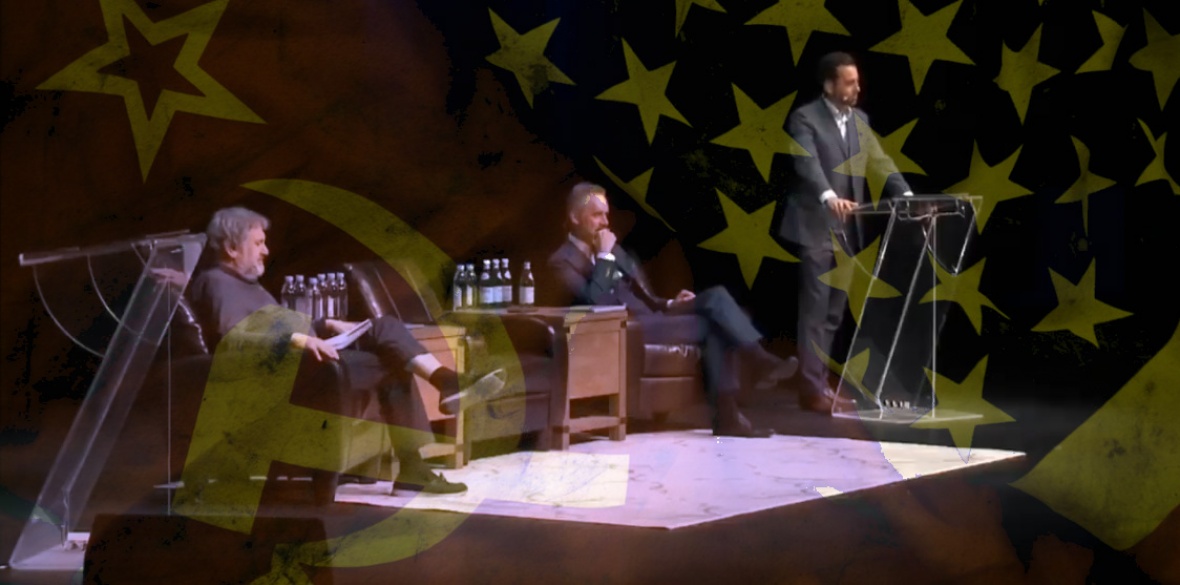This is the last article you can read this month
You can read more article this month
You can read more articles this month
Sorry your limit is up for this month
Reset on:
Please help support the Morning Star by subscribing here
OPENING up, greasy, lobster-venerating psychologist-cum-public-figure Jordan Peterson revelled in the fact that ticket touts were charging more for this clash of supposed intellectual heavyweights than they were for the for the ice-hockey final taking place down the road.
The audience whooped and cheered — surely they were in for a treat, or even part of something historic: had philosophy become the new rock ’n’ roll? Or would they be able to say: “I was there” when right slew left — or vice versa?
In a word — no. One minor truth of our time would be revealed, but through the paucity of the debate rather than its profundity.
Peterson’s popularity is hooked to the rising star of identity politics, like a dead rat nailed to a firework: people hate identity politics, so they love Peterson, who promises to give “hating identity politics” its intellectual due, while he maps the coming moral and ethical crisis of a Western civilisation that has become too liberated and licentious.
Alongside “New Atheist” Sam Harris and the conservative commentators Ben Shapiro and Douglas Murray, he is easily the most well known of what the New York Times has dubbed the “Intellectual Dark Web.”
Declaring war on political correctness via his YouTube channel back in 2016, Peterson is on leave from his academic post after videos of students confronting him over his refusal to use trans and non-binary “preferred pronouns” catapulted him to fame — and what a leave it has been.
His 2018 self-help book 12 Rules for Life: An Antidote to Chaos topped bestseller lists in Britain, the US and Canada, selling over two million copies, followed up by a world tour — 8,000 saw him speak alongside Harris and Murray at the O2 Arena in London.
It was perhaps this event and similar, that led to the debacle in Toronto: amped up by adoring crowds, supportive debate partners, and the intoxicating combination of being considered a great mind while being received as a motivational speaker, he took criticism from the Sloveninan Marxist Slavoj Zizek badly — and challenged the man who is considered perhaps the greatest living philosopher to a public debate

Peterson somehow thought he would be debating an orthodox Marxist and, rather than addressing anything Zizek has written or said, made a bizarre gambit where he distilled and attempted to refute 10 empirically contestable points from the Communist Manifesto — and only from the Manifesto: no intertextuality, no reference to Marx’s other works, or to the Marxist canon.
If you’ve ever listened to a Tory undergrad drunkenly dilate on the diktats of “human nature” you will have heard the same standard of argument, perhaps literally the same arguments.
This, then, was to be the only the only major revelation of the two-hour exchange: that beyond all the dirty glamour of being an alt-right darling and “trigggerer of liberals,” behind the fear he has inspired in woke academia, despite his mass rallies and interstellar book sales, Peterson is cosmically stupid.
Not only is Peterson an idiot who has now publicly revealed that he struggles with the basic theory around one of the core texts of politics and philosophy, but he is the kind of idiot who does not know he is an idiot: many were quick to comment that he seemed to have done no preparation for the debate, despite being the one who had made the challenge a year before.
By the end he had taken on the appearance of a student, politely asking Zizek to fill in the gaps is his knowledge, rather than challenging him. He asked, almost in awe of his opponent, why he called himself Marxist rather than a “Zizekist” — so varied and interesting had he found his answers. Zizek resisted the temptation to respond “because I am not as colossally egotistical as you” and patiently explained that Marxism was not the cult of Karl Marx, but a broad system of analysis.
Zizek spent no time addressing Marxism, not even to dismiss the most egregious misreadings (or, more correctly, lack of readings). This was a huge disservice to the audience, intellectually if nothing else, but at least many of them are now looking for better answers themselves — hopefully from better Marxists.
He did that thing that lots of continental philosophers and postmodern theorists do, that people desperate to be seen as very clever are always too afraid to call them out on: he built his arguments from eisegesis and erudite references, with only vaguely implied, assumed, or half-developed connections between points. This was totally expected but it is always worth pointing out.
He did make a few valid but by now banal social observations, like his old bit about the nazis’ anti-semitism stemming from a pathological social need for it (and so with other racisms in other times).
All this was a preamble to his basic point (since the debate was about happiness), which was an existential one: God is dead, freedom is difficult, we have to dedicate ourselves to some great cause.
Functionally this is not much different to Peterson’s discipline-is-freedom spiel. They are mutually complementary, at least, if not mutually constitutive, in that dedication to some external good builds personal excellence, and personal excellence demands such a dedication, and both engender happiness without happiness being their ends. They are both right on a lot of it — but there are much better places to get this stuff from.
When Zizek actually spoke about politics his most salient point was that we need communism to save us from climate change, but that it isn’t going to happen. I’d give the debate five out of 10. Worth a single watch if you are into this stuff — but Foucault debating Chomsky it was not.
Zizek almost drew blood at one point, chasing after Peterson for is quack conspiracy theory of “neo-Marxists” enacting “cultural Marxism” upon us from the campuses. Where are they, and who are they, demanded Zizek — name me one, just one of the leading lights of this “neo-Marxist” movement you claim is destroying America; of course he could not — because such a movement does not exist.
His response that apparently 25 per cent of US social scientists identify as Marxist, so something must be going was immediatey debunked — by himself: the “neo-Marxist” movement, he said, were those followed a Marxist theory of oppression who but had fused with postmodernism by replacing the oppression of the proletariat by the bourgeoisie, with the oppression of identity groups by other identity groups — so not Marxists at all then, Zizek interjected.
However, in his haste to say that he hated those people too, aren’t they terrible, he let Peterson escape from the yawning chasm that had opened up below him: the charlatan had just admitted his grand conspiracy was nonsense on its own terms, “neo-Marxism” as he defined it had nothing to do with Marxism, and probably did not exist.
So, Zizek won, obviously, but almost through Peterson’s forfeiting the match. You have wonder if Peterson’s long, awkward silence before his final comment (which was a trite tribute to the exchange of ideas) was him realising the damage he had done to his reputation and the popularity of the intellectual right.
His fans now know that hating so-called identity politics, “all that postmodern stuff” as Zizek put it, is not the exclusive property of the right — something the Slovenian was eager to hammer home: Zizek opened with an acknowledgement that they were both marginalised and attacked by the “left liberal” college establishment and closed an hour and a half later by stating: “The alternative to the alt-right is not political correctness … Please, if you are leftist, don’t feel obliged be politically correct.”
Faced with a left based on empiricism, that makes no promises that everyone will have a good time or even deserves one, and cares not a jot for political correctness — what chance does the “Intellectual Dark Web” stand?











